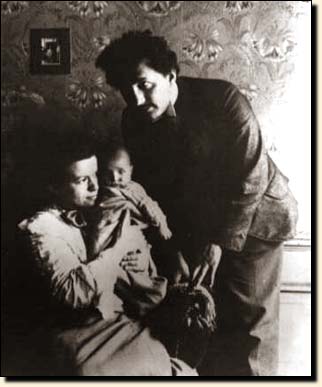In early 1902, Lieserl,
daughter of Einstein and Mileva Maric, a former fellow student, was born in
Hungary. Not much is known about the life of his daughter, as she was probably
given up to be adopted. During this time, Albert's father fell ill and passed
away. In January of 1903, Albert and Mileva marry, despite objections from both
families. In
1904, the Einstein's have their first son, Hans Albert. 1905 was Einstein's
"miracle year." In March of that year, he sent to the "Annalen
der Physik," the leading German physics journal, a paper with a new understanding
of the structure of light. He argued that light acts as though is consists of
independent particles of energy. Einstein built on Max Planck's work and went
beyond this. He showed that light quanta could help to explain phenomena being
studied by experimental physicists; he made clear how light ejects electrons
from metals. Photo from http://www.aip.org/history/einstein/
In
1904, the Einstein's have their first son, Hans Albert. 1905 was Einstein's
"miracle year." In March of that year, he sent to the "Annalen
der Physik," the leading German physics journal, a paper with a new understanding
of the structure of light. He argued that light acts as though is consists of
independent particles of energy. Einstein built on Max Planck's work and went
beyond this. He showed that light quanta could help to explain phenomena being
studied by experimental physicists; he made clear how light ejects electrons
from metals. Photo from http://www.aip.org/history/einstein/
In May of 1905, Einstein
submitted another paper that reinforced the kinetic energy theory. His Special
Theory of Relativity was born; Einstein submitted yet another paper in June
of 1905 on electromagnetism and motion. Since Galileo and Newton, physicists
had known that laboratory experiments never revealed a difference between an
object at rest and an object moving at a constant speed along a straight line.
Objects behave the same way on a uniformly moving ship as they do on an anchored
ship; this is the Principle of Relativity. However, according to the electromagnetic
theory, light should not obey this principle. This theory predicted that measurements
on velociy of light would show the effects of motion. Yet, no such effect had
been detected in any experiments-- the velocity of light did not vary. Einstein
found a way to show that the Principle of Relativity was compatible with electromagnetic
threory. Einstein later remarked that reconciling these seemingly incompatible
ideas required a new and careful consideration of the concept of time.


 In
1904, the Einstein's have their first son, Hans Albert. 1905 was Einstein's
"miracle year." In March of that year, he sent to the "Annalen
der Physik," the leading German physics journal, a paper with a new understanding
of the structure of light. He argued that light acts as though is consists of
independent particles of energy. Einstein built on Max Planck's work and went
beyond this. He showed that light quanta could help to explain phenomena being
studied by experimental physicists; he made clear how light ejects electrons
from metals. Photo from http://www.aip.org/history/einstein/
In
1904, the Einstein's have their first son, Hans Albert. 1905 was Einstein's
"miracle year." In March of that year, he sent to the "Annalen
der Physik," the leading German physics journal, a paper with a new understanding
of the structure of light. He argued that light acts as though is consists of
independent particles of energy. Einstein built on Max Planck's work and went
beyond this. He showed that light quanta could help to explain phenomena being
studied by experimental physicists; he made clear how light ejects electrons
from metals. Photo from http://www.aip.org/history/einstein/
